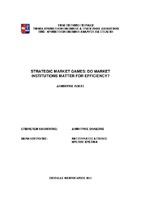| dc.contributor.advisor | Βολιώτης, Δημήτριος | |
| dc.contributor.author | Λόκας, Δημήτριος | |
| dc.date.accessioned | 2012-05-23T08:42:39Z | |
| dc.date.available | 2012-05-23T08:42:39Z | |
| dc.date.issued | 2012-05-23T08:42:39Z | |
| dc.identifier.uri | https://dione.lib.unipi.gr/xmlui/handle/unipi/4773 | |
| dc.description.abstract | Η παρούσα εργασία αναφέρεται σε συγκεκριμένη βιβλιογραφία, η οποία αφορά σε μοντέλα και στρατηγικά παίγνια για διαφορετικούς τύπους οικονομιών, και πώς αυτά επιδρούν στις διαφορετικές ισορροπίες προσφοράς και ζήτησης. Πιο συγκεκριμένα ελέγχουμε κατά πόσο οι θεσμοί συμβάλουν στη βέλτιστη κατανομή των αγαθών και κατά συνέπεια στην κοινωνική ευημερία.
Κάθε μοντέλο έχει συγκεκριμένα χαρακτηριστικά και περιορισμούς, που καθορίζουν τη συμπεριφορά και τις αποφάσεις των συναλλασσόμενων σε μια οικονομία. Ορίζεται η σχέση αγαθών και χρήματος, καθώς και η σχέση τιμής και ποσότητας για διαφορετικούς τύπους οικονομιών. Πιο συγκεκριμένα αντιπαραβάλουμε τους διαφορετικούς μηχανισμούς διαμόρφωσης τιμών σε μοντέλα μιας περιόδου, αλλά και περισσοτέρων.
Τέλος γίνεται μια αναφορά στο ρόλο του χρήματος, στις διαφορετικές μορφές του και πώς επιδρά στη γενική και στρατηγική ισορροπία, ανάλογα με τη χρήση του, ενώ επίσης παρατίθενται μοντέλα που επιτρέπουν το δανεισμό και τη χρεωκοπία των συναλλασσόμενων. Συμπερασματικά η συγκεκριμένη εργασία αποκαλύπτει τη σημασία της στρατηγικής ισορροπίας κυρίως σε ατελείς αγορές, και πώς δύναται κάποιος να φτάσει κάποιος μέσω αυτής στην κατά Παρέτο βελτιστοποίη | |
| dc.language.iso | en | |
| dc.rights | Αναφορά Δημιουργού-Μη Εμπορική Χρήση-Όχι Παράγωγα Έργα 4.0 Διεθνές | |
| dc.rights.uri | http://creativecommons.org/licenses/by-nc-nd/4.0/deed.el | |
| dc.subject | Marketing -- Management | |
| dc.subject | Product management | |
| dc.title | Strategic market games : do market institutions matter for efficiency? | |
| dc.type | Master Thesis | |
| europeana.isShownAt | https://dione.lib.unipi.gr/xmlui/handle/unipi/4773 | |
| dc.identifier.call | 658.8΄02 ΛΟΚ | |
| dc.description.abstractEN | This paper is a reference to certain economic models, which are already published by distinguished economists. These models refer to game theoretic approaches and they describe the different market supply and bidding strategies. Herewith, we want to reveal if and how the institutional intervention may offer another dimension in trading, trying to improve the general equilibrium in an economy with symmetric information.
Each model imposes certain rules and regulations that must be followed, which define the behavior and course of action of traders. We shall denote the relation between commodities and money, as well as between price and quantities and how these relations alter, as trade evolves. Therefore, we also refer to the different price formation mechanisms, in a single-period model in contrast with a multi-period model.
Furthermore, we shall refer to the role of money, the different kinds of it and we shall also describe how a gearing ratio allows agents to deal with trading opportunities and their resulting obligations respectively. All in all, we reveal the importance of the different strategic equilibria and how these can lead, whenever possible, to Pareto optimality. | |



